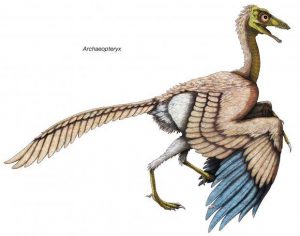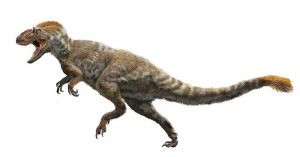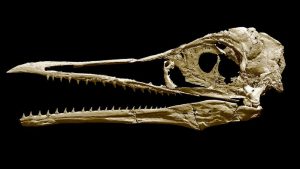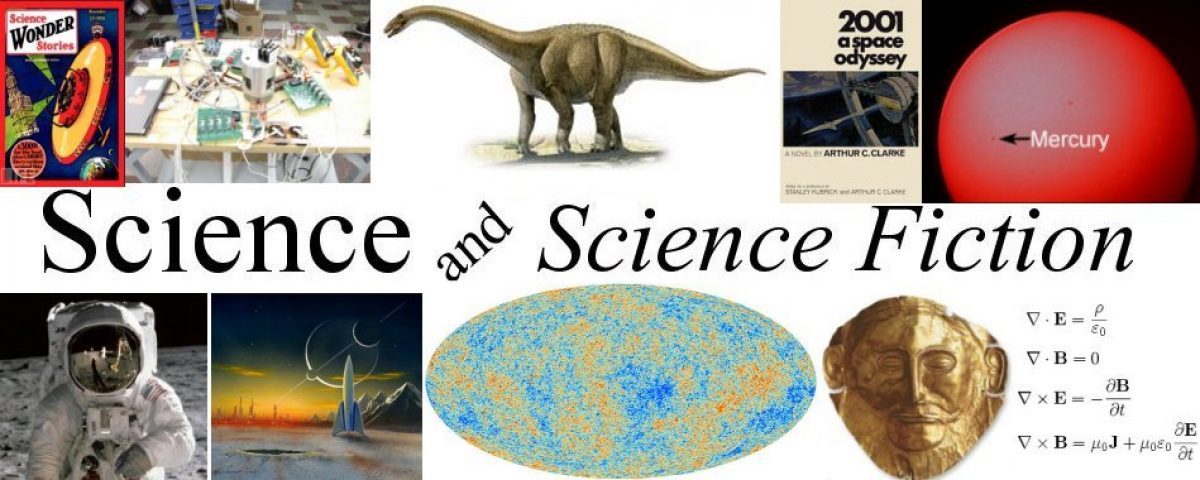In today’s world the taxonomic group we call birds have two unique anatomic characteristics that no other animals possess, feathers and beaks. Trying to understand how these distinct features evolved has been a goal of paleontologists since Darwin’s days.
Considerable progress has been made in the study of feathers with the discovery not only of early birds with feathers like Archaeopteryx but also of new evidence that some species of dinosaurs sported primitive feathers for insulation. The images below show archaeopteryx and a feathered T-rex (yes some paleontologists think the mighty T-rex might have been partially covered by feathers).


Evidence for the evolution of the bird’s beak however is much sparser; and the development of the beak is mostly unknown. Beaks by the way are composed of bony upper and lower mandibles (jaws) that are covered by a thin later of keratin (the protein in your hair and fingernails) and which lack teeth composed of dentine. Although similar in some ways to the mouths of other vertebrates the avian beak is a structure unique to birds.
The big problem in studying the development of the beak is that usually the delicate bones making up the skull of an early bird are so squashed that little can be learned from them. One thing we were certain of however was that feathers came first; there are many fossil specimens, again like Archaeopteryx, of early birds covered with feathers but sporting a mouthful of teeth.
Now a new study, combining both recent fossil finds and a reexamination of older specimens with the latest instruments, is changing that. It started in 2014 when Kristopher Super, then an undergraduate student at Fort Hays State University in Kansas, found an almost complete fossil of the well know early bird Ichthyornis dispar encased in limestone. A transitional species between the dinosaurs and birds I. dispar was a seagull sized creature that lived between 66 and 100 million years ago.
When the find was shown to Yale Professor of Paleontology Bhart-Anjan Bhullar he suggested that instead of trying to remove the specimen from the limestone it should be scanned by computerized tomography (CT scanning). What they found led them to perform CT scans on three other fossils for conformation. There, right at the very end of a long bony jaw filled with very sharp teeth sat a tip covered in keratin, a beak. Professor Bhullar suggests that even a tiny tip of a beak may have given I. dispar a greater ability to manipulate its food and preen its feathers. Exactly the behavioral activities that modern birds use their beaks for. The image below shows a composite of the CT scans of I. dispar.

The scientists also found that the skull of I. dispar shared a mixture of dinosaur and bird like features, a large brain case like that of a bird along with the powerful jaw muscles of a velociraptor like dinosaur. The evidence provided by I. dispar pushes back by millions of years the development of the bird’s beak while at the same time indicating that birds may have existed for millions of years with both a partial beak and a mouthful of teeth. The image below shows an artists rendering of the head of Ichthyornis dispar.

The first fossils of Ichthyornis were discovered in the 1870s by the US paleontologist Othniel C. Marsh, famous for his ‘Dinosaur Wars’ with Edward D. Cope. Even after almost 150 years we’re still leaning more about these amazing dino-birds.

Thanks, it’s very informative
Thanks to the great guide
Wow! I’m the Great Guide. Thanks for the comment.
Bob L
Thank you for the wonderful post
Thank you for the wonderful comment. Hope to see you come back real soon!
Bob L
Thanks to the great manual
Thanks for the comment and I hope you come back soon!
Bob L
Hi there, I enjoy reading all of your article post.
I like to write a little comment to support you.
Thanks for the comment and be sure to come back soon!
Bob L
I was curious if you ever thought of changing the page layout of your
site? Its very well written; I love what youve got to say.
But maybe you could a little more in the way of content so people
could connect with it better. Youve got an awful lot of text for
only having one or two images. Maybe you could space it out
better?
Thanks for the comment. I always try to add four or more images to illustrate each post but sometimes there may only be one or two that apply. That’s the way it is sometimes, sorry!
Bob L
Pretty! This has been an incredibly wonderful article.
Thank you for providing these details.
Thanks for the comment and come back soon!
Bob L
Link exchange is nothing else however it is only placing the other person’s website link on your page at appropriate place and other person will
also do similar for you.
Thanks for the comment and come back soon!
Bob L
These are actually wonderful ideas in concerning blogging.
You have touched some pleasant things here.
Any way keep up wrinting.
Thanks for the comment and come back soon!
Bob L
What’s Going down i’m new to this, I stumbled upon this I’ve found It positively helpful and it has
helped me out loads. I am hoping to give a contribution & help different users like its aided me.
Good job.
Thanks for the comment and come back soon!
Bob L
Good article! We are linking to this particularly great
post on our site. Keep up the good writing.
Thanks for the comment and come back soon!
Bob L
I need to to thank you for this excellent read!!
I definitely loved every bit of it. I’ve got you bookmarked to look at new stuff you post…
Thanks for the comment and come back soon!
Bob L
Hey there! I simply want to offer you a huge thumbs up for your excellent information you have got right
here on this post. I’ll be returning to your site for more soon.
Thanks for the comment and come back soon!
Bob L
I am regular reader, how are you everybody? This paragraph
posted at this website is genuinely nice.
Thanks for the comment and come back soon!
Bob L
I am curious to find out what blog platform you happen to be using?
I’m experiencing some small security problems with my latest blog and I’d like to
find something more safeguarded. Do you have any
suggestions?
Thanks for the comment. I use wordpress as my platform, it was supplied by my host site ipage. Hope that helps!
Bob L
Hi, I would like to subscribe for this web
site to obtain latest updates, therefore where can i do it please help.
Thanks for the comment. You can register for updates right off the site. So come back soon!
Bob L
Magnificent goods from you, man. I’ve understand your stuff previous to and you are just too magnificent.
I really like what you’ve acquired here, really like what you are stating and the way in which you say
it. You make it enjoyable and you still take care of to keep it
sensible. I can not wait to read far more from you.
This is actually a terrific web site.
Thanks for the comment and come back soon!
Bob L
Hello to all, the contents existing at this web page are in fact
awesome for people experience, well, keep up the nice work fellows.
Thanks for the comment and come back soon!
Bob L
Incredible! This blog looks just like my old one!
It’s on a entirely different subject but it has pretty
much the same layout and design. Superb choice of colors!
Thanks for the comment and come back soon!
Bob L
Its not my first time to pay a visit this website, i am browsing this web
site dailly and take nice information from here daily.
Thanks for the comment and come back soon!
Bob L
It’s hard to find experienced people in this particular topic, however,
you seem like you know what you’re talking about!
Thanks
Thanks for the comment and come back soon!
Bob L
I am regular reader, how are you everybody? This paragraph posted at this web page
is truly fastidious.
Thanks for the comment and come back soon!
Bob L
If you are going for best contents like I do, only visit this website all the time since it presents feature contents, thanks
Thanks for the comment and come back soon!
Bob L
Thanks, it is quite informative
Thanks for the comment and come back soon!
Bob L
Thanks, it is quite informative
Thanks for the comment and come back soon!
Bob L
My family members always say that I am killing my time here at web, however I know I
am getting experience everyday by reading thes nice posts.
Thanks for the comment and come back soon!
Bob L